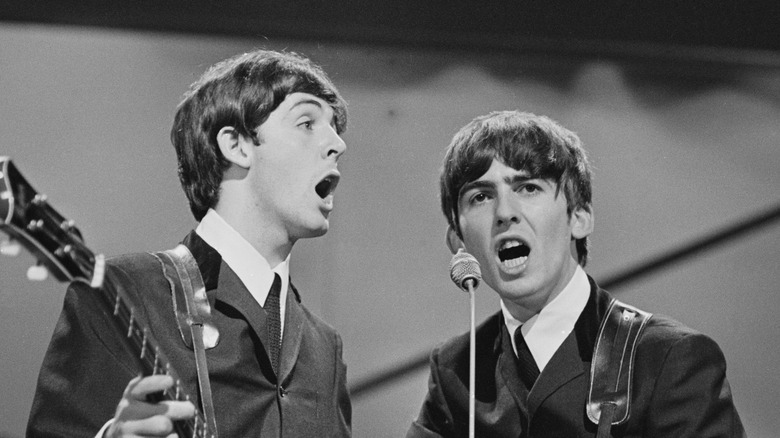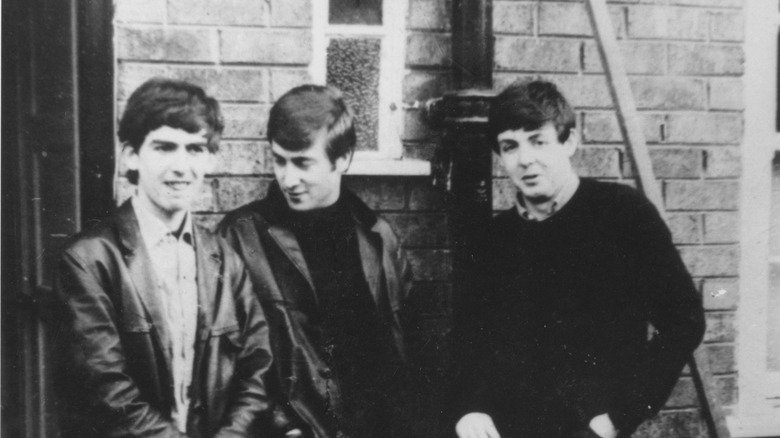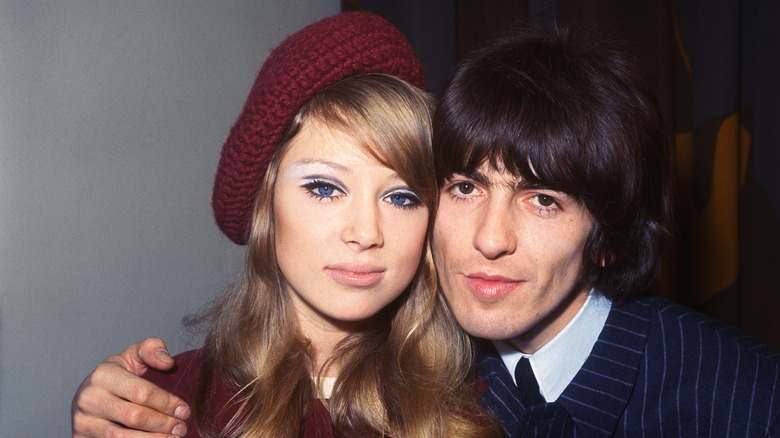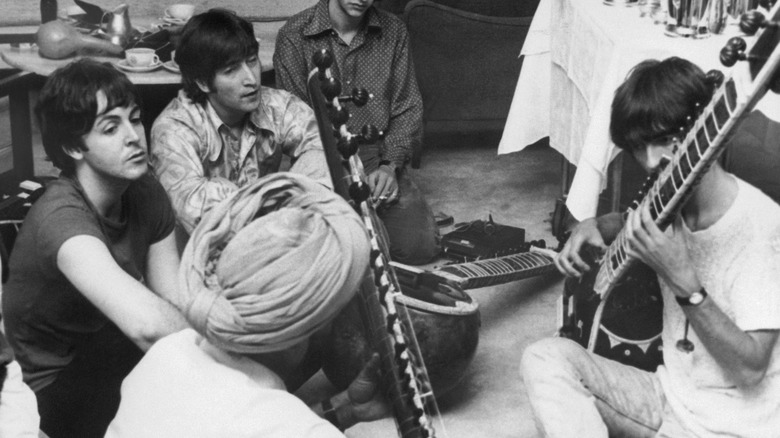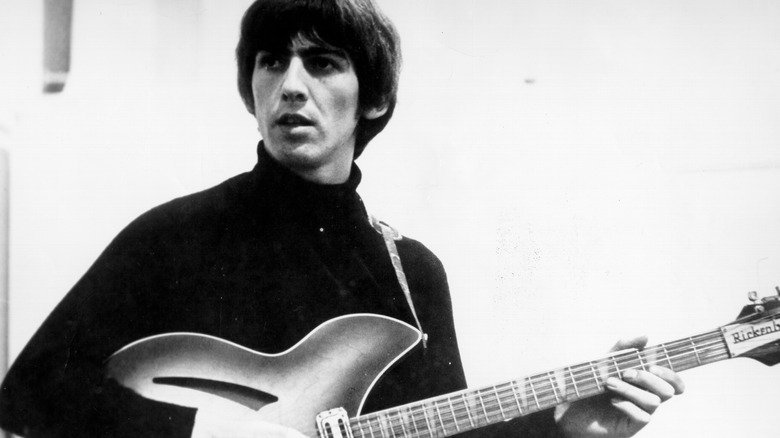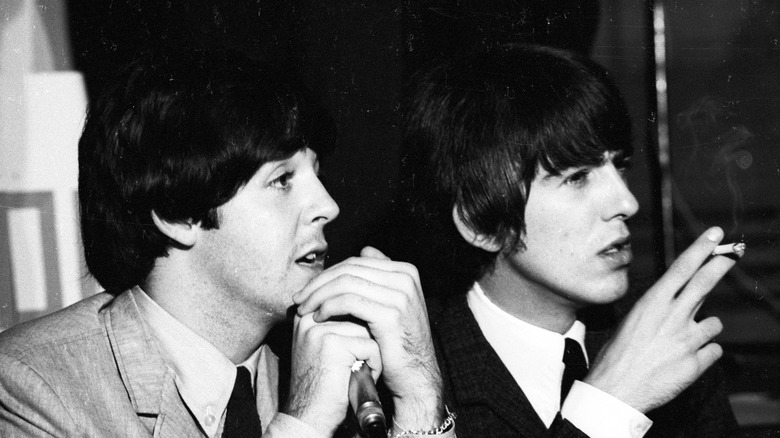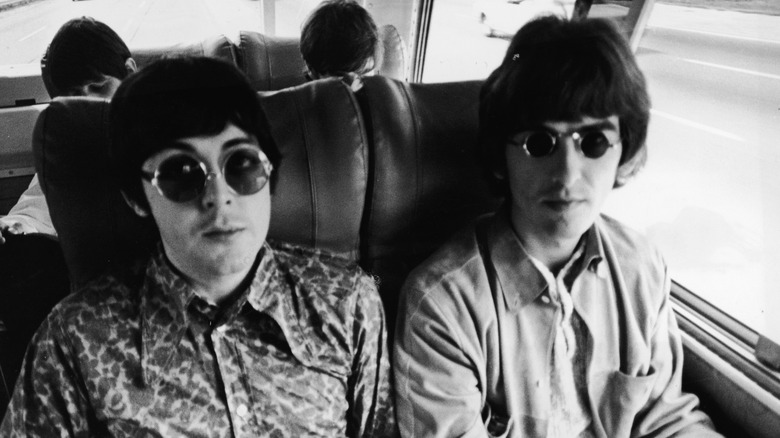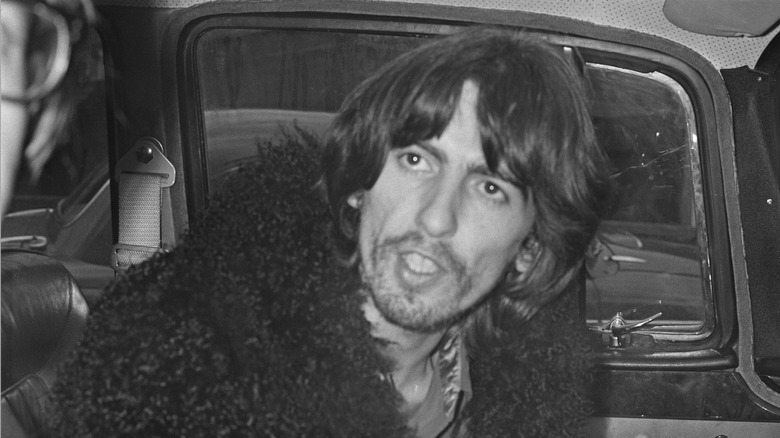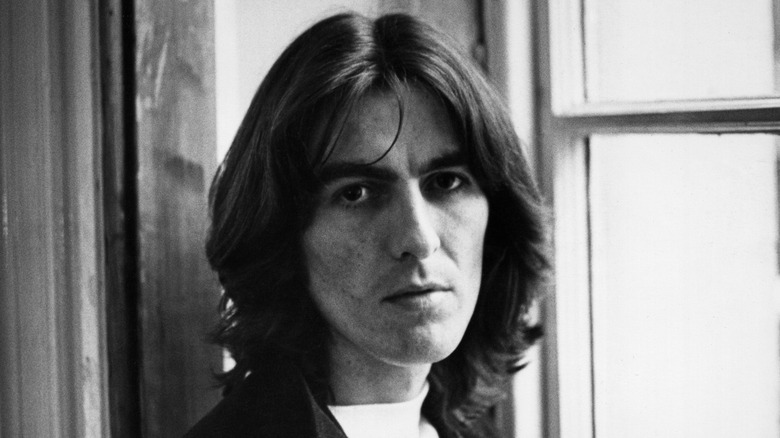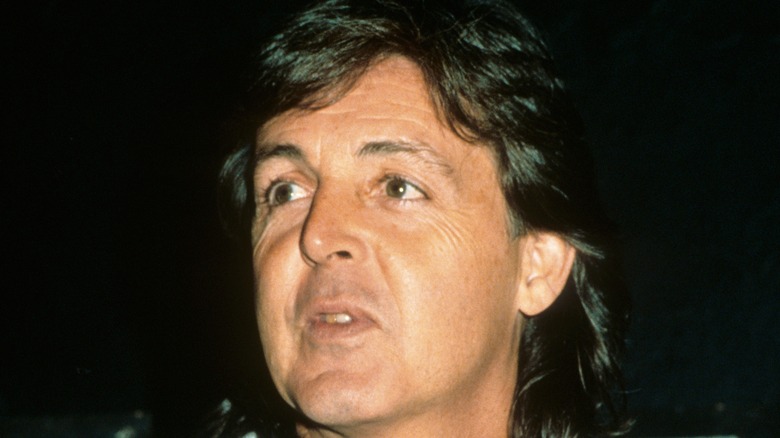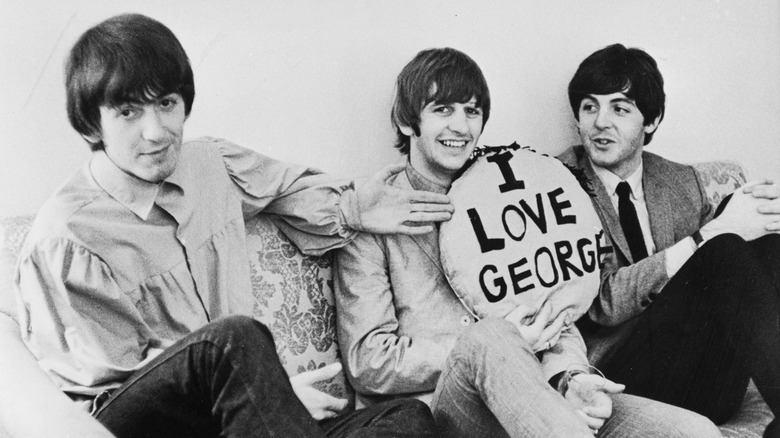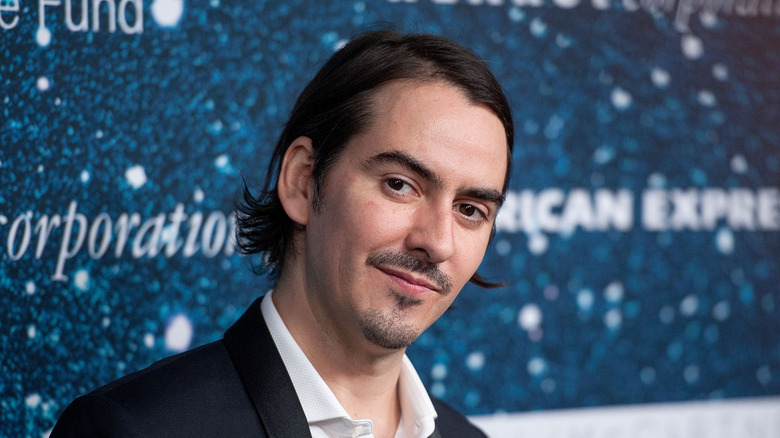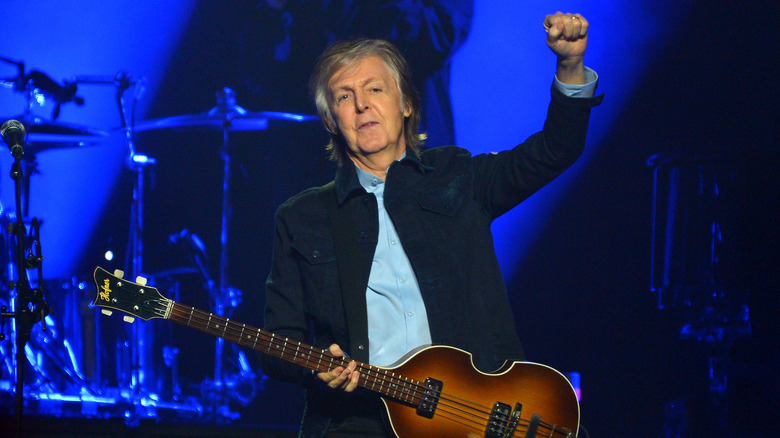Inside Paul McCartney's Relationship With George Harrison
Paul McCartney's relationship with John Lennon, as the most famous songwriting duo in history, is one of the most documented relationships in rock 'n' roll, as is McCartney's continued relationship with Ringo Starr, since the two are the last surviving Beatles during the age of the Internet. But McCartney's relationship with George Harrison is a little more mysterious — and seemingly more complex.
Along with Lennon, McCartney was seen as a leader in the Beatles, helming projects like "Sgt. Pepper's Lonely Hearts Club Band," while Harrison had a reputation as "the Quiet One," as noted by NBC News. But both Harrison and McCartney were hugely successful songwriters, respectively penning the two most-covered Beatles songs of all time, according to Rolling Stone: McCartney's "Yesterday" and Harrison's "Something."
The pair famously clashed in the studio, and it has been reported that they didn't get along at all. But there's a lot to be said about their friendship before and after the Beatles' historic decade in the sun. In fact, beyond the music, Harrison and McCartney may have had the closest relationship of any two Beatles. Here's an exploration of the pair's moments of incompatibility as bandmates and their ultimate harmony as friends.
Paul McCartney introduced George Harrison to John Lennon
George Harrison met Paul McCartney at school in 1954. McCartney was a year older, but the two bonded over their love of the "skiffle" genre of music, according to Ian Inglis' 2010 book "The Words and Music of George Harrison."
A few years later, McCartney introduced Harrison to John Lennon and their skiffle-centric band the Quarrymen. Though reports of the exact date vary, historian and Beatles biographer Mark Lewisohn has estimated that the three future Beatles met on February 6, 1958 (via World History Project)."I'd been invited to see them play several times by Paul but for some reason never got round to it before," George Harrison is quoted as saying in Barry Miles' "The Beatles Diary Volume 1: The Beatles Years." "I remember being very impressed with John's big thick sideboards and trendy teddy boy clothes. He was a terribly sarcastic bugger right from day one, but I never dared back down from him."
McCartney recalled Harrison's audition during a 2008 interview for Uncut. "He pulled out his guitar and played 'Raunchy,' and that was it — he was in the band," he said. "He was a bit too young, almost out of the age range for us, a little too baby-faced, but he was just a great player."
The Quarrymen disbanded a couple of years later. As the 1960s began, so did the Beatles.
Paul McCartney was the best man (and only Beatle) at George Harrison's wedding
On January 21, 1966, George Harrison married model Pattie Boyd, forming a union that would go down in rock 'n' roll history, as noted by Vogue. Although the wedding took place in the midst of the Beatles' fame, Paul McCartney was the only other member of the band to attend the ceremony — and he was Harrison's best man, according to Boyd's 2008 memoir "Wonderful Tonight: George Harrison, Eric Clapton, and Me." Boyd noted that McCartney sat between Harrison's parents during the ceremony. During a lull, McCartney took it upon himself to entertain Boyd's younger half-brothers, David and Boo.
"When Paul realized that David and Boo were bored, he took them outside in search of fun," Boyd wrote. "In a disused loo, with hundreds of fan letters waiting for Mrs. Harrison's attention, they found George's bow and arrows. Paul showed the boys how to use it. David pulled back the string, and Paul watched the arrow score a direct hit on the bonnet of his gleaming Rolls-Royce."
George Harrison and Paul McCartney clashed over their respective passion projects
The creation of the Beatles' 1967 album "Sgt. Pepper's Lonely Hearts Club Band" marked a shift in power dynamics for the band. According to the Independent, the album was based primarily on Paul McCartney's ideas. In the years that followed, McCartney continued pushing to lead his own projects, including "Magical Mystery Tour."
Then, in 1968, the Beatles traveled to India to learn transcendental meditation from Maharishi Mahesh Yogi. The trip was largely motivated by George Harrison's interest in Eastern philosophy and how it might inspire the band. But his bandmates were not quite as "present" as he was.
"He was quite strict," McCartney said of Harrison in "The Beatles Anthology" (via Rolling Stone). "I remember talking about the next album and he would say, 'We're not here to talk about music — we're here to meditate.' Oh yeah, all right Georgie Boy. Calm down. Sense of humor needed here, you know."
The following year, when McCartney called Harrison to discuss the band leaving Apple Records, Harrison replied, "You'll stay on the f*cking label. Hare Krishna" (via the Independent).
George Harrison's lack of writing credits created tension in the Beatles
George Harrison did not receive recognition equal to John Lennon and Paul McCartney until 1969, when the Beatles recorded and released the album "Abbey Road." It was the last album the band recorded, and the first one for which Harrison was duly recognized for his songwriting with two of the album's standout songs, "Here Comes the Sun" and "Something." The latter song was subsequently covered by icons including Ray Charles, Elvis Presley, Smokey Robinson, and Frank Sinatra. Lennon once said it was "the best track on the album" (via Far Out magazine).
But by the time the Beatles recorded "Abbey Road" in 1969, the band was already on the outs due to various grievances, and Harrison's was his lack of creative control or recognition. These frustrations came to a head that year, as is apparent in a conversation recorded by writer Anthony Fawcett and included in Barry Miles' 1998 biography "Paul McCartney: Many Years From Now." "Well, the thing is, I think that until now, until this year, our songs have been better than George's," McCartney said to Lennon. "Now this year his songs are at least as good as ours."
Harrison seemed to reject McCartney's backhanded compliment. "That's a myth, because most of the songs this year I wrote last year or the year before, anyway," he said. "Maybe now I just don't care whether you are going to like them or not, I just do 'em."
George Harrison criticized Paul McCartney's bass playing and 'fruity' songs
George Harrison didn't always see eye to eye with Paul McCartney musically. "I'd rather have Willie Weeks on bass than Paul McCartney," Harrison said during a 1974 interview, as quoted in Ashley Kahn's "George Harrison on George Harrison: Interviews and Encounters." "That's the truth, with all respect to Paul ... Paul is a fine bass player ... but he's a bit overpowering at times ... I'd join a band with John Lennon any day, but I couldn't join a band with Paul McCartney, but it's nothing personal. It's just from a musical point of view."
Harrison has also detailed a recording session for the McCartney-penned 1969 song "Maxwell's Silver Hammer." "Paul would always help along when you'd done his ten songs, then when he got 'round to doing one of my songs, he would help," Harrison recalled of the session. "It was silly. It was very selfish, actually. Sometimes Paul would make us do these really fruity songs. I mean, my God, 'Maxwell's Silver Hammer' was so fruity. After a while we did a good job on it, but when Paul got an idea or an arrangement in his head..."
Paul McCartney admitted he underestimated George Harrison's songwriting skills
Paul McCartney and John Lennon are known as the primary songwriters of the Beatles, but in the band's later years, George Harrison was the writer behind classics including "Here Comes the Sun," "Something," and "While My Guitar Gently Weeps." Following the Beatles' breakup, Harrison released several solo albums that went platinum.
During a 2020 interview, Howard Stern asked Paul McCartney if he thought he had underestimated Harrison's songwriting prowess while the band was together. "It was easy to underestimate George because me and John, like you said, had always written most of the stuff, and had had most of the singles, and George was a late bloomer as far as writing was concerned," McCartney replied. "He wasn't that interested in the beginning but then he started to get interested and, boy, did he bloom, you know? He wrote some of the greatest songs ever."
An argument with Paul McCartney led George Harrison to temporarily quit the Beatles
On January 10, 1969, during the infamous "Let It Be" sessions, George Harrison quit the Beatles. As Harrison is quoted as saying in "The Beatles Anthology," Ringo Starr had briefly quit the band once before, and John Lennon was getting itchy feet, too. "For me, to come back into the winter of discontent with the Beatles in Twickenham was very unhealthy and unhappy," Harrison recalled.
The fact that the sessions were being filmed for Michael Lindsay-Hogg's documentary "Let It Be" only heightened tensions. "As everybody knows, we never had much privacy — and now they were filming us rehearsing," Harrison said. "One day there was a row going on between Paul and me. It's actually in the film ... I thought, 'What's the point of this? I'm quite capable of being relatively happy on my own and I'm not able to be happy in this situation. I'm getting out of here.'" So he told the band he was quitting.
"At that point in time, Paul couldn't see beyond himself," Harrison told Guitar World. "He was on a roll, but... in his mind, everything that was going on around him was just there to accompany him. He wasn't sensitive to stepping on other people's egos or feelings."
Harrison ended up rejoining the band two weeks later, but his brief break was fruitful: The day he quit, he wrote the song "Wah Wah," which became a standout track on his album "All Things Must Pass" the following year.
George Harrison wrote a song about his tumultuous relationship with Paul McCartney
By 1969, trouble was brewing among the members of the Beatles. When George Harrison briefly quit the band during its "Let It Be" sessions that year, he used his newfound freedom to pen some of the songs that would contribute to the success of his solo album "All Things Must Pass." According to Far Out magazine, one of these songs took direct aim at Paul McCartney. The track in question, "Run of the Mill," appears on the second side of "All Things Must Pass" and features lyrics such as, "No one around you / Will carry the blame for you" and "You've got me wondering how I lost your friendship" (via Genius).
"I liked the words to 'Run of the Mill,'" Harrison wrote in his 1980 memoir "I, Me, Mine." "It was when Apple was getting crazy — Ringo wanted it blue, John wanted it white, Paul wanted it green and I wanted it orange. Paul was falling out with us all and going around Apple offices saying 'You're no good' — everybody was just incompetent (the [Monty Python] Spanish Inquisition sketch). It was that period — the problem of partnerships."
George Harrison and Paul McCartney reunited in the studio in 1994
On February 11, 1994, George Harrison, Paul McCartney, and Ringo Starr reunited in McCartney's studio. The group, which was nicknamed the "Threetles," were collaborating on reviving some unused John Lennon demos. According to the Independent, Harrison was assertive at the sessions, pushing for a mellow, melodic guitar solo on one song. "I felt that the song shouldn't be pulled in any way," McCartney said of Harrison's guitar solo, as quoted in "Still the Greatest: The Essential Songs of the Beatles' Solo Careers." "It should stay very Beatles. It shouldn't get to sound like me solo or George solo, or Ringo for that matter. It should sound like a Beatles song. So, the suggestion was made that George might play a simple bluesy lick rather than get too melodic."
Harrison also insisted that his friend Jeff Lynne act as producer. "It was George who said, 'No, we need a producer,'" McCartney recalled (via the Independent). "It could be dangerous just to all get in the studio. Could get nasty. You've got egos flying around."
According to Ultimate Classic Rock, the pair also disagreed on which lyrics would best complete "Free As A Bird," which was started by Lennon years earlier. "That was really like working on a record with John, as Lennon/McCartney/Harrison, because we all chipped in a bit on this one," McCartney told Mark Lewisohn later that year. "George and I were vying for best lyric."
Despite their disagreements in music, Harrison and McCartney remained friends until the former's death.
Paul McCartney has described George Harrison as his 'little baby brother'
George Harrison died on November 29, 2001, at the age of 58. According to The New York Times, he'd undergone surgery for throat cancer in 1998 and treatment for lung cancer and a brain tumor in 2001.
During a 2008 interview for Uncut, Paul McCartney recalled visiting Harrison in the hospital. "I sat with him for a few hours when he was in treatment just outside New York," he said. "He was about 10 days away from his death, as I recall. We joked about things — just amusing, nutty stuff. It was good. It was like we were dreaming. He was my little baby brother, almost, because I'd known him that long. We held hands. It's funny, even at the height of our friendship — as guys — you would never hold hands. It just wasn't a Liverpool thing. But it was lovely."
The day after Harrison's death, McCartney talked to reporters about his late friend. "He was a lovely guy and a very brave man and had a wonderful sense of humor," he said. "He is really just my baby brother."
Dhani Harrison has referred to Stella McCartney as his sister
Paul McCartney's daughter, Stella, was born in 1971. George Harrison's son, Dhani, was born in 1978. Today, the Beatles offspring have a sibling-type relationship. Speaking to Interview magazine in 2012, Stella praised Martin Scorsese's George Harrison documentary, "Living in the Material World." "I wanted to cry when Dhani was reading out George's parts," she said. "It's really important that people know more about George, because obviously he didn't get as much attention as the others."
When Dhani got married to Icelandic model Sólveig Káradóttir in 2012, Stella designed the bride's wedding dress, according to E! Online. When Stella — a successful fashion designer — was honored at a Corporate Fund gala in 2014, Dhani surprised her with a performance of her father's song "Live and Let Die," according to The Wall Street Journal. Dhani, who carries on his father's legacy as a musician, also played Stella's favorite song, The Everly Brothers' "Love of My Life," per Empire. "Stella has looked out for me my whole life," he said (via Showbiz 411).
Paul McCartney talks to George Harrison through a fir tree
After decades of friendship and collaboration, it's no surprise that George Harrison's devotion to the spiritual realm has impacted Paul McCartney. As McCartney said during a 2020 interview for NPR's "All Things Considered," Harrison's spirit is still fully alive in his life.
"George was very into horticulture, a really good gardener," McCartney said. "So he gave me a tree as a present: It's a big fir tree, and it's by my gate. As I was leaving my house this morning, I get out of the car, close the gate and look up at the tree and say, 'Hi, George.' There he is, growing strongly. And you know, that takes me back to the time when I hitchhiked with him! They're an ever-present presence, if that's a way to say [it]."
For all their ups and downs, Harrison and McCartney remain connected, if only in an abstract sort of way. "As the years go by, every time I look at it I go, 'That's the tree George gave me,'" McCartney told NPR. "George has entered that tree for me. I hope he's happy with that."
